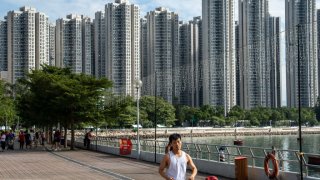
China's real estate industry is collapsing in slow motion.
Major developers like Evergrande and Country Garden remain stuck in spiraling debt problems. So-called 'ghost cities' dot the Chinese countryside. And now the International Monetary Fund just cut its global growth forecasts for 2024 and called out China's real estate crisis as a big reason why.
"It's important to recognize that there is a longer-term challenge here, and that is we essentially have too large a construction sector in China, we have too large a real estate sector because underlying demand for apartments is declining," said Frederic Neumann, HSBC chief Asia economist, in an interview with CNBC. "We have slowing urbanization. We have declining demographics."
China's overall post-pandemic economic recovery has been less than stellar. Youth unemployment is at record levels, gross domestic product forecasts have been lowered and the ongoing real estate crisis has been hitting consumer confidence and foreign investment in the country.
Beijing is now attempting to alleviate the sector's pressure with several policy moves like lowering minimum down payments and allowing for the adjustment of mortgage rates. The spillover effects on the global economy, though, could create headwinds for years to come, said Neumann.
"China's shrinking real estate sector over the coming years will really have a huge impact on heavy industry, on the commodity markets globally," he said. "There's going to be less steel demand. There’s going to be less cement being used — less glass, for example. That impacts within China heavy industrial areas that really produce these raw materials."
Get Connecticut local news, weather forecasts and entertainment stories to your inbox. Sign up for NBC Connecticut newsletters.
Watch the video above to learn more about where the sector goes from here.




